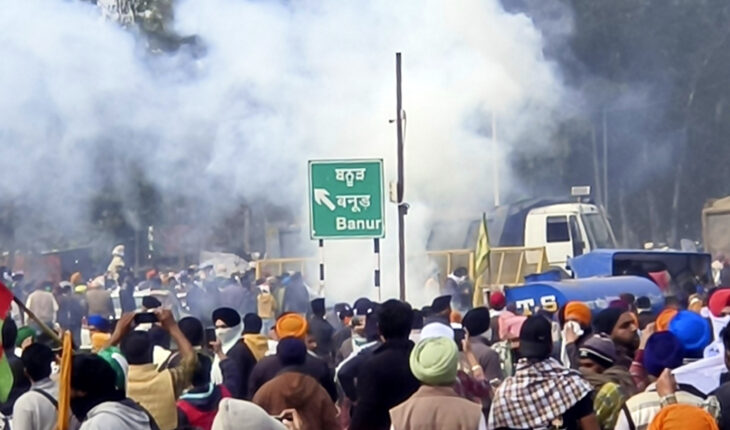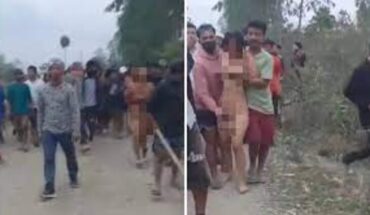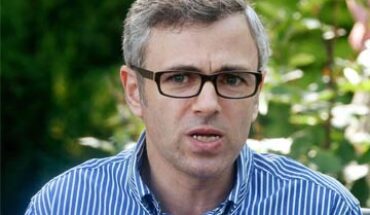New Delhi : Tens of thousands of farmers from Punjab and Haryana are once again making their way to the national capital to demand guaranteed crop prices, renewing a movement from two years ago that succeeded in getting the government to repeal contentious new agricultural laws.
Moreover, the police used tear gas, detained a number of farmers and heavily barricaded border points to block the protesters from entering New Delhi.
In an effort to prevent a recurrence of the 2020-2021 protests, which were labeled as one of the largest agitations globally involving over 250 million farmers, stringent security measures have been put in place, putting Delhi on high alert. Section 144 has been imposed, internet services to several districts have been suspended, and the borders with Delhi have been sealed.
This protest emerges about two years after farmers called off their year-long agitation in December 2021, following assurances from the government that their demands would be considered, particularly regarding guaranteed prices for all agricultural produce.
However, farmer unions argue that the promises made by the Modi government have not been fulfilled.
Why are the farmers protesting once again?
In 2020, farmers from various North Indian states, including Haryana, Punjab, and Uttar Pradesh, protested against three new farm laws introduced by the government. These laws were perceived by many farmers as unfair and detrimental to their livelihoods, as they aimed to reform the agricultural sector. The laws undermined the existing system of government-regulated wholesale markets (mandis), lacked legal assurances for Minimum Support Price (MSP), and facilitated more flexible contract farming agreements.
The protesting farmers demanded the repeal of these laws and the implementation of a law mandating MSP for all crops to ensure fair prices. They also sought relief from escalating electricity bills, which exacerbated their financial burdens.
After nearly a year of protests, the government finally agreed to repeal the laws in November 2021 and accepted most of the farmers’ demands, marking a significant victory for the agricultural community.
However, two years later, farmer unions argue that the government has not followed through on its promise to legally guarantee Minimum Support Price (MSP).
In a video message shared by Kisan Mazdoor Morcha coordinator Sarvan Singh Pandher on X on February 7, he outlined ten demands from the government, including promises made during the previous protest regarding MSP legislation, justice for the events in Lakhimpur Kheri, withdrawal of all Delhi cases against farmers, commitment to not implement the new electricity bill, and exemptions for farmers from pollution regulations. Additionally, there is a new demand for debt relief for farmers and laborers.
Pandher, a key leader of the protest, stated on Saturday that they would peacefully march to Delhi on February 13. He urged farmers and laborers nationwide to join the protest, emphasizing that it would be a decisive battle to secure all their demands. He emphasized the importance of maintaining peaceful protest despite any actions taken by the government, urging patience and perseverance in their fight.
In the span of two years following the conclusion of the farmers’ protest, repeated demonstrations have been staged, urging the government to honor its commitments. Despite these persistent calls for action, little progress has been made.
In March 2022, the Samyukta Kisan Morcha (SKM) orchestrated a nationwide protest against the government’s failure to meet its assurances, particularly regarding the establishment of a panel on Minimum Support Price (MSP).
Abhimanyu Kohar, a senior member of SKM, informed to a newagency that despite the promises made by the Centre concerning the formation of an MSP panel, withdrawal of cases against farmers, and the removal of Union minister Ajay Mishra Teni from the Cabinet, no substantial steps had been taken. Consequently, SKM resolved to stage a nationwide protest at district and block levels on March 21 to voice their discontent.
On January 31, 2022, SKM observed a “day of betrayal” to protest against the government’s failure to fulfill its commitments, leading to widespread demonstrations across the country.
In August 2022, Rakesh Tikait, a spokesperson for the Bhartiya Kisan Union (BKU), cautioned about a potential resurgence of farmer agitation, calling upon all farmers to unite and brace themselves for a movement aimed at safeguarding their livelihoods and lands.
Subsequently, in September 2023, under the leadership of Rakesh Tikait, a Kisan Mazdoor Mahapanchayat convened in Lucknow, drawing thousands of protesting farmers together to hold the government accountable for its perceived “false and failing promises.”
Despite these efforts, several other protests and calls for action have gone unanswered.
Opposition leaders such as Mallikarjun Kharge, Akhilesh Yadav, Rahul Gandhi, and Deepender Singh Hooda have consistently criticized the BJP government for its failure to deliver on its promises. They have accused the government of prioritizing corporate interests over the welfare of farmers.






